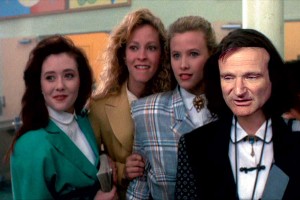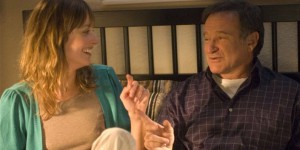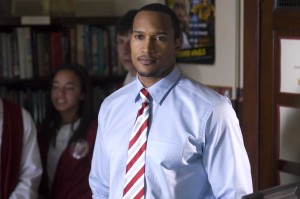World’s Greatest Dad

Bobcat Goldthwait originally envisioned saving the budget for World’s Greatest Dad by digitally replacing Winona Ryder with Robin Williams. Unfortunately, Goldthwait couldn’t get the rights to Heathers and so he was forced to just make a dull, uncredited remake, with Robin Williams simply playing a male (much to his own chagrin).
For all the mean-spirited humor and nasty comeuppances it contains as a movie, Heathers is rather tame. This isn’t the fault of screenwriter Daniel Waters, who envisioned a conclusion far darker than the comparatively quaint one used. Waters had planned a scene where Winona Ryder kills Christian Slater and then blows up the school and everyone attending the rally in the gym. It then cuts to Heaven, where everyone is at the prom with various cliques intermingling and dancing with each other while Martha Dumptruck sings on stage. This reasserts Slater’s line about the only place everyone gets along is in Heaven. As filmed, the conclusion of Heathers plays like a “we were just kidding; we didn’t mean it” apology, where Winona saves the day, thereby excusing how complicit she was in the suicide/murders. No one who would be offended by the original ending would have handled the previous 90 minutes all that well, so it’s a mystery who the studio thought they would be pleasing with this concession.
 Writer/director Bobcat Goldthwait’s World’s Greatest Dad suffers from the same skittishness as Heathers, prefacing an ending that functions as an apology and an undercutting of any harsh etiquette or any satire it might have mustered. It isn’t just the toothlessness that Goldthwait takes from Heathers; he also takes most of the same basic plot points, including the notion of writing up fake suicide notes and the community rallying around someone who they did not respect for their intelligence while they were alive.
Writer/director Bobcat Goldthwait’s World’s Greatest Dad suffers from the same skittishness as Heathers, prefacing an ending that functions as an apology and an undercutting of any harsh etiquette or any satire it might have mustered. It isn’t just the toothlessness that Goldthwait takes from Heathers; he also takes most of the same basic plot points, including the notion of writing up fake suicide notes and the community rallying around someone who they did not respect for their intelligence while they were alive.
The slight twist on the Heathers premise in World’s Greatest Dad is that Goldthwait has his main character, a sad-sack teacher and failed writer played by Robin Williams, try to profit off of his son’s death. Whereas in Heathers, the targets were those who Slater and Ryder hated — the popular kids. The emotional connection is a nicely cruel touch in WGD, though it doesn’t overcome the logical fallacy that a highly unpopular and disliked kid would suddenly be seen as profound because of a cliché-filled suicide note. Goldthwait seems to have forgotten how distant and self-involved most teenagers are and how embracing something wholeheartedly would never happen from clique to clique (and was already parodied in Heathers considering how much glee most of the students show in the suicides, celebrating the day off, more than the death). But because Goldthwait envisioned World’s Greatest Dad as a farce, reality doesn’t have to impinge on it, which also sort of excuses his limited visual talents and tendency to boil each scene down to sitcomy discomfort.
 Honestly, there simply isn’t very much going on in World’s Greatest Dad (the opening act is very, very slow), and there’s not enough outrageous dialogue (though one funny bit occurs when there’s almost no one at his son’s funeral, Williams is reassured, “don’t blame yourself, it was a weekday”) or twists to distract from the notion that the movie is only a soccer mom’s version of offensiveness. The one original and consistent creation is Daryl Sabara’s (one of the two Spy Kids) performance as Williams’ son. He’s hateful, dumb, awkward, perpetually angry and describes everything as “faggy.” When he leaves the movie, any energy it had goes with him and we’re left with Williams’ sad, rubbery face building up resentment at one of the other teachers who got an article into The New Yorker. While that spurs Williams’ motivation to hatch his devious plan, he and all of the characters exhibit behavior that changes from scene to scene, doing whatever the plot requires. Smart, honest people become idiotic and shallow, and vice versa. And there’s a fundamental misunderstanding of how the publishing world works (why would a publisher want to buy Williams’ book if it is already available for free?).
Honestly, there simply isn’t very much going on in World’s Greatest Dad (the opening act is very, very slow), and there’s not enough outrageous dialogue (though one funny bit occurs when there’s almost no one at his son’s funeral, Williams is reassured, “don’t blame yourself, it was a weekday”) or twists to distract from the notion that the movie is only a soccer mom’s version of offensiveness. The one original and consistent creation is Daryl Sabara’s (one of the two Spy Kids) performance as Williams’ son. He’s hateful, dumb, awkward, perpetually angry and describes everything as “faggy.” When he leaves the movie, any energy it had goes with him and we’re left with Williams’ sad, rubbery face building up resentment at one of the other teachers who got an article into The New Yorker. While that spurs Williams’ motivation to hatch his devious plan, he and all of the characters exhibit behavior that changes from scene to scene, doing whatever the plot requires. Smart, honest people become idiotic and shallow, and vice versa. And there’s a fundamental misunderstanding of how the publishing world works (why would a publisher want to buy Williams’ book if it is already available for free?).
Even so, Goldthwait could have gotten away with all these logical lapses had he been willing to commit to his vision. His ending is judgmental, sappy, and attempts to take the moral high ground. What fun is a movie that pretends to be bold and daring if, rather than allowing the characters to continue to indulge in their basest material fantasies, it has them come to their senses? Since when is sensible behavior funny?



